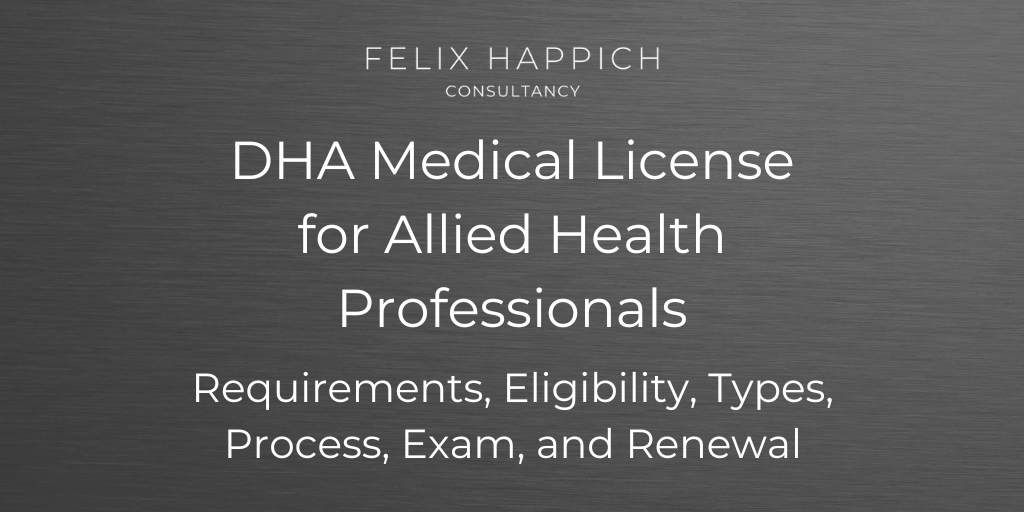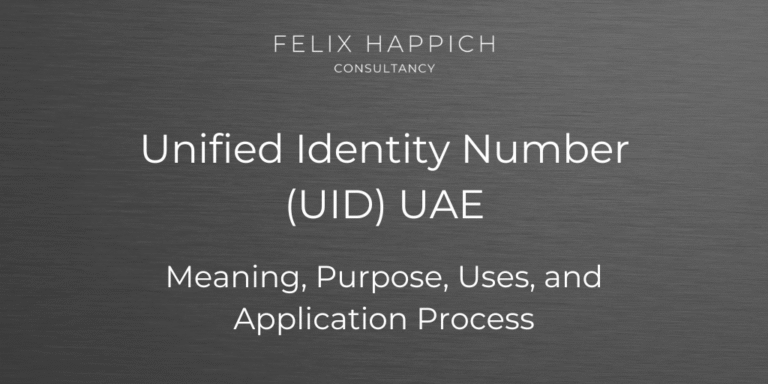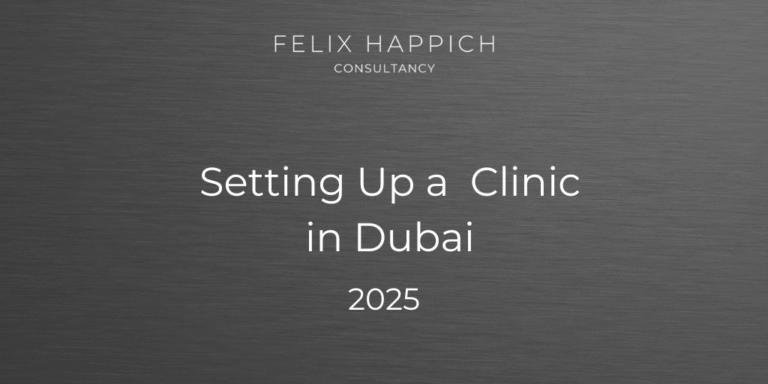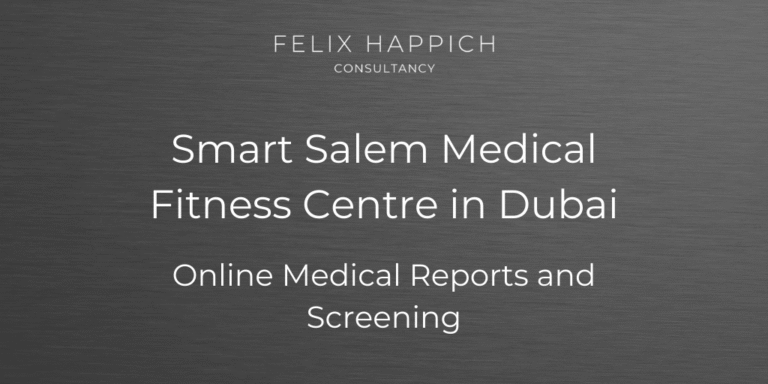The DHA license for allied health professionals (AHP) is a mandatory regulatory certification for working in the Dubai healthcare system, covering over 50 medical sectors, including dietitians, clinical psychologists, radiation therapists, and so on. However, each role has fixed and specific criteria that you must meet to qualify for legal work in Dubai. The license confirms that an AHP meets DHA’s education and work experience standards and protects patient care, strengthening the overall medical sector of the emirate.
To qualify, applicants need specific academic and clinical experience thresholds based on the license category. The DHA classifies allied health professions in over 23 main categories under the DHA’s Professional Qualification Requirements (PQR), each with a unique set of eligibility rules. For instance, an orthoptist should have a valid degree in orthoptics or equivalent training and a minimum of 2 years of clinical experience.
Before starting the actual process, you have to fulfill the DHA’s eligibility criteria, which you can verify manually or using the self-assessment tool on the Sheryan portal. Once you meet the criteria, you have to follow a systematic process involving multiple steps, including dataflow verification, document uploads, and scheduling the Prometric exam.
The time required for this entire process depends on the type of license, your document readiness, and whether exams are mandatory. Most delays happen due to mismatched data or incomplete submissions. However, the average time to obtain an allied healthcare license is approximately 3–4 weeks. Similarly, the cost also varies depending on the type of license you choose and whether you are working with a firm or handling it yourself. The average cost ranges somewhere between 3000 AED to 6000 AED.
Once you get the license, you will be allowed to offer services based on your specialty in Dubai’s medical sector. However, one thing to keep in mind is that this license isn’t valid for a lifetime, but you have to renew it yearly while keeping yourself updated with industry trends.
This article provides a step-by-step process of how to complete your DHA application faster, reducing the risks of rejection, and keeping everything within a legal boundary.
What are the DHA license requirements for Allied Health Professionals in Dubai?
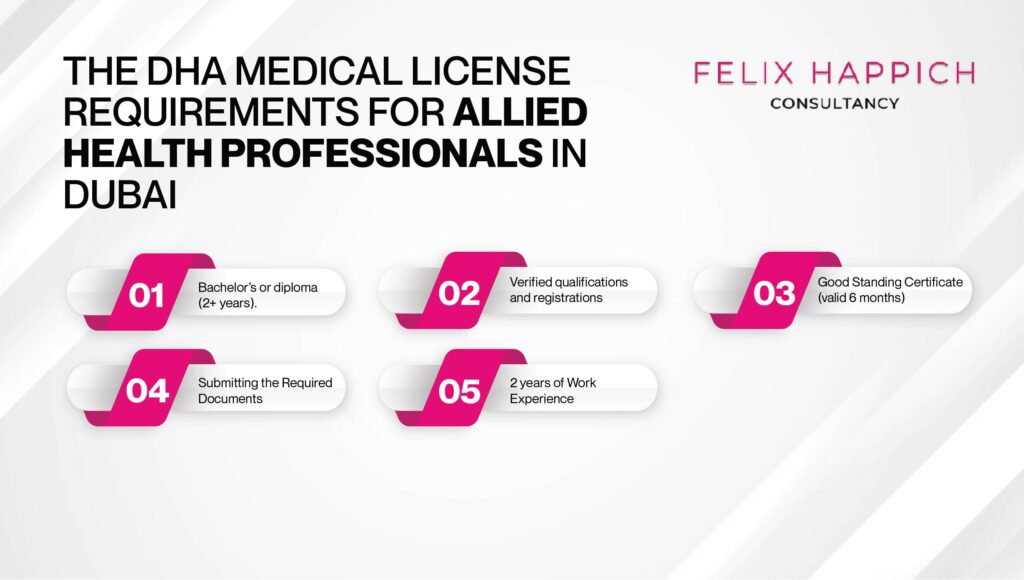
The DHA license requirements for Allied Health Professionals in Dubai include graduating from an accredited school, having a valid license in your home country or country of practice, without a clinical work gap of more than two years. Additionally, you also need to show that you’ve worked for at least two years after graduation.
Moreover, you have to provide your passport, recent photos, and your resume for identification. Based on your license type, you may also need to sit for a Prometric exam or go through primary source verification (PSV) via DataFlow, which checks if your documents are real. Below are the 5 key requirements for obtaining an Allied Health Professional license from the DHA.
- Minimum Qualification is either a Bachelor’s degree or a Diploma with at least 2 years of formal education.
- Verified qualifications, work experience, and professional registrations as per PQR standards.
- GSC should be recent and not exceed a 6-month validity period.
- Required Documents
Applicants must submit the following:
- Valid passport copy
- Passport-size photograph
- Attested educational certificates
- Home country professional license
- Clinical experience proof
- Recent resume/CV
- Assessment results (if applicable)
- Legal translations (if not in English or Arabic)
- Payment proof for processing
- Specific Clinical Experience Requirements:
- Physicians: Minimum of 2 years post-graduation experience.
- Dentists: Minimum 2 years post-internship clinical experience.
- Nurses/Midwives: 2 years post-qualification clinical experience.
- Allied Health Professionals: 2 years or more, based on category.
What are the eligibility criteria for allied health professionals applying for a DHA license?
The eligibility criteria for allied health professionals to obtain a DHA license include having qualifications from a university accepted by the DHA, completion of an internship or two years of clinical experience, and holding an active professional license from the applicant’s home country or last country of practice. Your application could get rejected right away if your qualification isn’t recognized.
Additionally, you need a proof of good standing certificate if you’ve worked in another country. Dubai doesn’t ignore professional violations from overseas. Having a suspension or warning letter elsewhere will cause license rejection. Below are the 5 main checkpoints.
- Must be a graduate from an accredited university/college recognized by DHA.
- Completion of an internship or 2 years of clinical training is mandatory.
- The license must be current and active in the applicant’s home country or the country of last practice.
- Applicants must be free from any criminal record or malpractice history.
- Candidates are expected to meet English language proficiency, proven through tests like IELTS or TOEFL when applicable.
What types of DHA licenses are available for allied health professionals?
The types of DHA licenses available to allied health professionals include Physiotherapist, Radiographer, Dietitian, Occupational Therapist, Medical Laboratory Technologist, and Speech Therapist. However, each one matches a specific job title. You can’t use one title to work in another field that keeps healthcare safe and roles well-defined.
Each type has its own educational and experience standards. A Clinical Psychologist needs a Master’s degree and supervised experience. On the other hand, a Dental Hygienist might only need a diploma, but they still have to complete practice hours and pass a verification. Below are the main types of DHA licenses issued under the category of Allied Health:
- Aesthetic/Beauty Therapy
- Allied Health Technician Title Qualifications Experience
- Anesthesia
- Assisted Reproductive Technology (ART)
- Audiology
- Cardiac Perfusion
- Cardiovascular Technology
- Cast Technology
- Central Sterile Services (CSS)
- Clinical Dietetics and Nutrition
- Dental Clinical Support
- Electro-Neurodiagnostics
- Emergency Medical Services
- Forensics Allied Health
- Genetic Counseling
- Hair Transplant
- Health Education
- Laser Hair Reduction Therapy
- Medical Laboratory
- Medical Physics
- Occupational Therapy
- Operation Theatre Technology
- Optometry
- Pharmacy
- Physician Assistance
- Physiotherapy
- Podiatry
- Prosthetics and Orthotics
- Psychology
- Public Health
- Radiation Therapy
- Renal Dialysis
- Respiratory Therapy
- Social Worker
- Speech Therapy
- Toxicology
What is the DHA license application process for allied health professionals in Dubai?
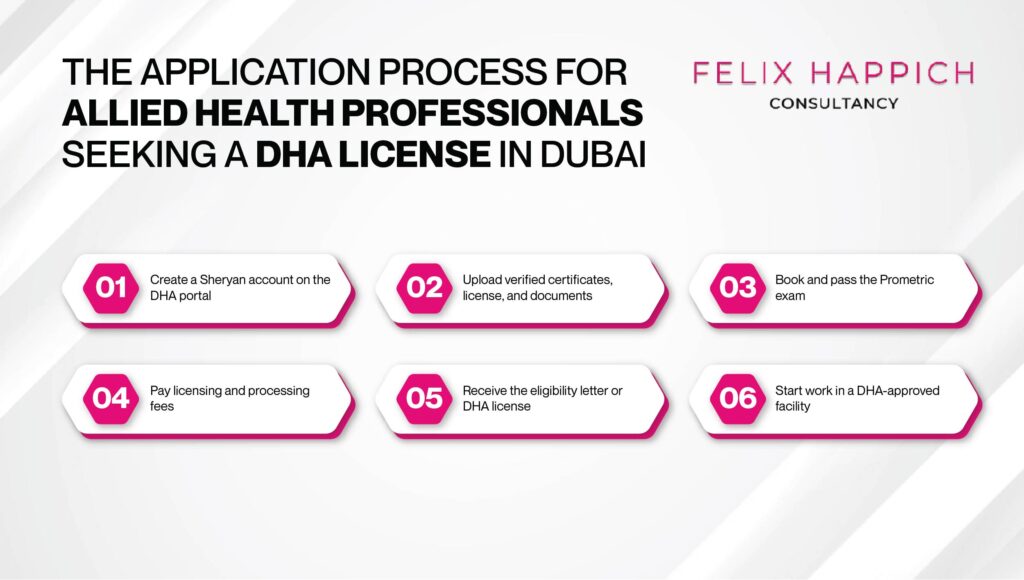
The process of getting a DHA license in Dubai for an allied health professional includes creating a Sheryan account on the DHA portal, completing the online application, and uploading verified documents and a professional license from their home country or previous place of work.
Once submitted, the DHA reviews the documents for eligibility as per the Professional Qualifications Requirements (PQR). Candidates must then pass the Prometric assessment specific to their profession, if documents are approved. After passing the exam, the applicant has to fulfill the required cost. Then, DHA will issue an eligibility letter or license. This will allow the professional to practice in a registered facility within Dubai.
The following license procedures help allied health professionals avoid delays caused by missing documents or overlooked verification stages.
- Upload all required documents, including educational certificates, passport copy, and professional experience letters, through the DHA Sheryan portal.
- The DHA reviews the submitted documents to ensure they meet the Professional Qualifications Requirements (PQR) for your specific profession.
- Once the documents meet the criteria, DHA grants approval for you to proceed to the next steps in the licensing process.
- Schedule and take part in the Prometric exam specific to your healthcare profession. Passing the exam is required for further processing.
- Pay the necessary licensing fees after successfully passing the Prometric exam.
- DHA will issue your eligibility letter or professional license once all fees are paid and documents are verified.
- After receiving the license, you are permitted to practice in a DHA-approved healthcare facility in Dubai.
How much time does it take to obtain a DHA license for allied health professionals in Dubai?
It takes somewhere around 1–2 months (30–60 days) for allied health professionals to get a DHA license. However, this depends on different factors such as the type of license, the consultant approach (if any), and the number of attempts for the Prometric exams.
The time required for the main steps is provided in the table below:
| Step | Average Time Required |
|---|---|
| Document Verification (PSV) | 2–6 weeks |
| Examination Scheduling and Results | 1–4 weeks |
| Eligibility Letter | Within 2 weeks post-assessment |
| Final License Issuance | 1–2 weeks (after facility application) |
How much does it cost for allied health professionals to obtain a DHA license in Dubai?
The cost of obtaining a DHA license for allied health professionals is between AED 1,000 to AED 3,000. The cost depends on your job type, how much verification is needed, and if you must take the Prometric exam.
Here’s the cost breakdown based on our years of experience as business consultants in Dubai.
| Fee Type | Cost Range (AED) |
|---|---|
| Application Fee | 300 – 500 |
| Primary Source Verification (PSV) | 1,000 – 1,500 |
| Prometric Exam Fee | 300 – 500 |
| License Activation Fee | 500 – 1,000 |
What is the validity period of a DHA license for allied health professionals?
The validity period of a DHA license for allied health professionals is one (1) year (365 days), as stated in the Dubai Unified Healthcare Professional Qualification Requirements (PQR). Professionals must renew their license annually. This is the standard duration for most healthcare professionals in Dubai. After this period, monthly charges apply if the license surpasses the expiry date. If the license remains expired for more than six (6) months, it will be cancelled. As part of the renewal process, professionals must meet the Continuing Medical Education/Continuing Professional Development (CME/CPD) requirements, specifically.
- The Eligibility Letter is valid for 1 year
- 10 CME/CPD hours per year for allied health professionals
What are the limitations faced by allied health professionals during DHA licensing?
The limitations faced by allied health professionals during DHA licensing include being restricted to working within Dubai, clinical gap restrictions, and mandatory language proficiency. Additionally, you must pass the exam within three attempts; otherwise, you will no longer be eligible for a DHA license. The other common limitations are
- Unaccredited qualifications or unrecognized programs.
- Gaps in clinical experience exceeding 2 years.
- Failure to clear assessments after 3 attempts.
- Document discrepancies or falsified records.
- Language barriers if documents aren’t in English or Arabic.
- Limited scope if applying for unsupported titles or sectors.
Can allied health professionals with a DHA license work outside Dubai?
No, allied health professionals with a DHA license can only work in Dubai. To work in another emirate, they must apply for a separate license from that emirate’s health authority. For example, to work in Abu Dhabi, professionals must obtain a license from the Department of Health (DoH). Similarly, to work in any other emirate, a license must be obtained from the respective health authority.
The table below shows the healthcare licensing authorities for all emirates in the UAE for allied health professionals.
| Emirate | Health Authority | License Name |
|---|---|---|
| Dubai | Dubai Health Authority | DHA License |
| Abu Dhabi | Department of Health | DoH License |
| Sharjah | Ministry of Health and Prevention | MOHAP License |
| Ajman | Ministry of Health and Prevention | MOHAP License |
| Umm Al Quwain | Ministry of Health and Prevention | MOHAP License |
| Ras Al Khaimah | Ministry of Health and Prevention | MOHAP License |
| Fujairah | Ministry of Health and Prevention | MOHAP License |
Why do DHA license applications get rejected for allied health professionals?
The DHA license application for Allied health professionals gets rejected due to unrecognized qualifications, insufficient experience, or past professional misconduct or disciplinary actions in other countries. Additionally, unverified documents and non-compliance with DHA practice standards can also lead to rejection. Below are the main reasons why license applications get rejected for allied health professionals.
- Failure in Primary Source Verification (PSV) — e.g., diploma not verified.
- Mismatch in qualification and title applied for.
- Insufficient clinical experience.
- Submitting incomplete documents.
- Having a criminal record or disciplinary action.
- Failure in the Prometric exam.
- If the Good Standing Certificate is missing, invalid, or older than 6 months.
- Gap in clinical work for more than 2 years without evidence of continued education or refresher training.
What is the process for a disqualified allied health professional to get a DHA license?
The process for a disqualified allied health professional to get a DHA license starts with finding out exactly why the application was rejected or disqualified. Once the problem is identified, the actual problem of license rejection, the next step is to fix that and reapply for the approval. These reasons for rejection could be missing documents, verification problems, or issues with qualifications or experience.
- Ensure that all your documents are in the correct format, if the disqualification is due to incorrect documentation.
- Gain additional professional experience or take extra courses to meet the qualifications, if the problem lies in your experience or education.
- Re-take the Prometric exam if you have failed it. However, if you exceed the limit of three attempts, you must apply for the exam under another emirate, such as DOH or MOHAP.
- Contact DHA directly or consult with a licensing expert if you are unsure how to proceed after addressing the reason for disqualification and ensuring that all requirements are met.
Expert help for allied health professionals to get a DHA license in Dubai
Expert consultation can be incredibly valuable for saving your time, preventing costly mistakes, and increasing your chances of success because of having extensive knowledge of the DHA’s rules, regulations, and procedures. A consultant helps you guide your step-by-step DHA license application process, helping you understand exactly what documents are required and how to prepare them because of thier familiarity with the intricacies of the process, and can help you avoid common mistakes that might lead to delays or disqualification. Similarly, to make the process easier, Felix Happich Consultants provides expert consultation to allied healthcare professionals, reducing their stress and improving their chances of getting the license.

